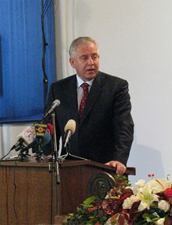 Prime minister of the Republic of Croatia dr. Ivo Sanader addresses the guests in German language and emphasizes a long tradition of German-Croatian cooperation in the educational field and a special role of the Center for European Education. „The Center is a result of good German-Croatian cooperation in all areas, especially in the education sector. (…) Croatia has taken over a gap-bridging role between the European Union and South-East Europe and this Center offers us a chance to give our own contribution to the development of education in the countries yet to become part of the union (…), but also to contribute to further sthrengthening of the role of Zagreb as university center.
Prime minister of the Republic of Croatia dr. Ivo Sanader addresses the guests in German language and emphasizes a long tradition of German-Croatian cooperation in the educational field and a special role of the Center for European Education. „The Center is a result of good German-Croatian cooperation in all areas, especially in the education sector. (…) Croatia has taken over a gap-bridging role between the European Union and South-East Europe and this Center offers us a chance to give our own contribution to the development of education in the countries yet to become part of the union (…), but also to contribute to further sthrengthening of the role of Zagreb as university center.
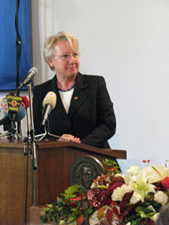 German federal minister of education and research, dr. Annette Schavan, stressed in her address that this institution is a real European project, an important novelty and an impulse for the European education area. This institution «can become a center of excellence in all issues of European education and a meeting point for general and occupational education. The Center will contribute to the sharpening of European awareness and the strengthening of European spirit and European soul.
German federal minister of education and research, dr. Annette Schavan, stressed in her address that this institution is a real European project, an important novelty and an impulse for the European education area. This institution «can become a center of excellence in all issues of European education and a meeting point for general and occupational education. The Center will contribute to the sharpening of European awareness and the strengthening of European spirit and European soul.
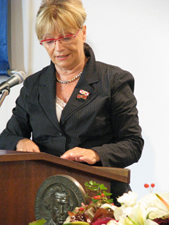 The chairwoman of the South-East European Delegation of the European Parliament, dr.h.c. Doris Pack (MEP), considered in her address the mediating dimension of the Center for European Education. „The absolute domination of economy is behind us. If we want to continue the process of European development, we need new visions. » In this context Doris Pack stressed the role of the Center for the region of South-East Europe – the Center shall contribute with its study programs to the spreading of the fundamental values of the European Union – human rights, tolerance and cultural and language diversity.
The chairwoman of the South-East European Delegation of the European Parliament, dr.h.c. Doris Pack (MEP), considered in her address the mediating dimension of the Center for European Education. „The absolute domination of economy is behind us. If we want to continue the process of European development, we need new visions. » In this context Doris Pack stressed the role of the Center for the region of South-East Europe – the Center shall contribute with its study programs to the spreading of the fundamental values of the European Union – human rights, tolerance and cultural and language diversity.
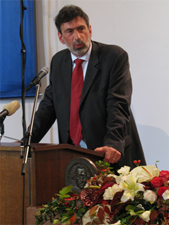 Croatian minister of science, education and sports, prof.dr. Dragan Primorac, who was regretfully unable to attend the Celebration, was replesented by prof.dr. Radovan Fuchs, head of Department for International Cooperation at the Ministry of science, education and sports. Prof.dr. Fuchs emphasized in his address that the Center for European Education is compatible with the Government’s policy of the development of a society of knowledge in Croatia. “The Center is being opened just in time when Croatia is going through the process of reform of its education system.”
Croatian minister of science, education and sports, prof.dr. Dragan Primorac, who was regretfully unable to attend the Celebration, was replesented by prof.dr. Radovan Fuchs, head of Department for International Cooperation at the Ministry of science, education and sports. Prof.dr. Fuchs emphasized in his address that the Center for European Education is compatible with the Government’s policy of the development of a society of knowledge in Croatia. “The Center is being opened just in time when Croatia is going through the process of reform of its education system.”
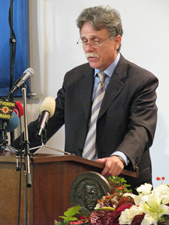 Project manager and member of the executive board of the Center for European Education, prof.dr. Siegfried Gehrmann from the Faculty of Teacher Education of the University of Zagreb, considered in his opening speech the six year long founding period of the Center and presented its basic goals: international cooperation in higher education, interdisciplinarity in teaching and science, cooperation with business organisations and political institutions in the development of new study programs and the strengthening of European multilingualism. “We have a chance to develop in in Zagreb the next six years a center of excellence for the issues of European education. In order to accomplish that goal we still need the support of our partners from the fields of science, politics and economics.”
Project manager and member of the executive board of the Center for European Education, prof.dr. Siegfried Gehrmann from the Faculty of Teacher Education of the University of Zagreb, considered in his opening speech the six year long founding period of the Center and presented its basic goals: international cooperation in higher education, interdisciplinarity in teaching and science, cooperation with business organisations and political institutions in the development of new study programs and the strengthening of European multilingualism. “We have a chance to develop in in Zagreb the next six years a center of excellence for the issues of European education. In order to accomplish that goal we still need the support of our partners from the fields of science, politics and economics.”
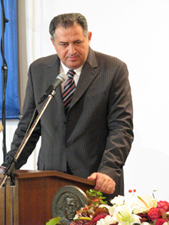 Managing director of “Školska knjiga” publishing house and at patron of the Center for European Education, Mr Ante Žužul, focused his addressing speech on the necessity of future consideration of cultural and national identities in Europe from the European perspective and preservation of those identities and their shaping through European cooperation. In this respect he emphasized the central role of Center for European Education regarding coordination and cooperation in the field of education and as a platform for communication and work on national and international projects. „The interest of Croatia’s economy in the work of the Center is large, because its productivity is related to education.”
Managing director of “Školska knjiga” publishing house and at patron of the Center for European Education, Mr Ante Žužul, focused his addressing speech on the necessity of future consideration of cultural and national identities in Europe from the European perspective and preservation of those identities and their shaping through European cooperation. In this respect he emphasized the central role of Center for European Education regarding coordination and cooperation in the field of education and as a platform for communication and work on national and international projects. „The interest of Croatia’s economy in the work of the Center is large, because its productivity is related to education.”
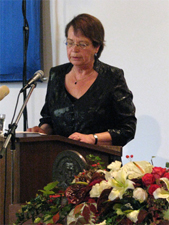 Manager and member of the executive board of the Center for European Education from the Institute for Educational Science of the University of Münster, prof.dr. Marianne Krüger-Potratz, stressed in her address that the first study program of the Center – one year master study of Management and Counselling in European Education – shall begin in October 2008 in Zagreb. She explained that this study program qualifies for the tasks of managing reform processes in the field of education and gives insight into problem-solving strategies, as well as into problems of other countries. “The Center offers an organisational framework for the study and is seen as an institutional guarantee of permanence and transfer (…). But, the master study program is not going to be the only program offered by the center; it is seen as a platform for other programs of permanent professional development and achievement of additional qualifications.
Manager and member of the executive board of the Center for European Education from the Institute for Educational Science of the University of Münster, prof.dr. Marianne Krüger-Potratz, stressed in her address that the first study program of the Center – one year master study of Management and Counselling in European Education – shall begin in October 2008 in Zagreb. She explained that this study program qualifies for the tasks of managing reform processes in the field of education and gives insight into problem-solving strategies, as well as into problems of other countries. “The Center offers an organisational framework for the study and is seen as an institutional guarantee of permanence and transfer (…). But, the master study program is not going to be the only program offered by the center; it is seen as a platform for other programs of permanent professional development and achievement of additional qualifications.
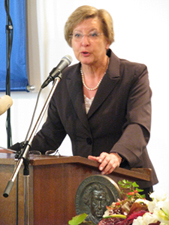
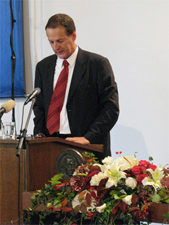 Respective rectors of the Universities of Zagreb and Münster, prof.dr. Aleksa Bjeliš and prof.dr. Ursula Nelles, emphasized the central role of the Center for European Education regarding internationalisation of both universities in the context of the implementation of the Bologna process. They also emphasized the necessity of the development of European study programs in the framework of international consortiums of higher education istitutions as one of reform strategies. Therefore, both rectors gave their wholehearted support to the development of Croatian-German Center in Zagreb, with courses held in Zagreb and Münster.
Respective rectors of the Universities of Zagreb and Münster, prof.dr. Aleksa Bjeliš and prof.dr. Ursula Nelles, emphasized the central role of the Center for European Education regarding internationalisation of both universities in the context of the implementation of the Bologna process. They also emphasized the necessity of the development of European study programs in the framework of international consortiums of higher education istitutions as one of reform strategies. Therefore, both rectors gave their wholehearted support to the development of Croatian-German Center in Zagreb, with courses held in Zagreb and Münster.
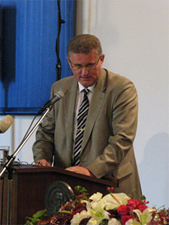
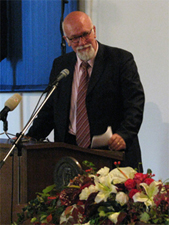 Representatives of holding institutions of the TEMPUS „Learning for Europe“ project, dean of the Faculty of Teacher Education of the University of Zagreb, prof.dr.h.c. Vladimir Šimović and Hans Joachim von Olberg, dean for education of the Faculty of Educational and Social Science of the University of Münster, emphasized the responsibility of both institutions in international cooperation within the university consortium and their positive attitude toward the development of the Center for European Education as a permanent higher education institution as well as toward long-term cooperation at binational and international level.
Representatives of holding institutions of the TEMPUS „Learning for Europe“ project, dean of the Faculty of Teacher Education of the University of Zagreb, prof.dr.h.c. Vladimir Šimović and Hans Joachim von Olberg, dean for education of the Faculty of Educational and Social Science of the University of Münster, emphasized the responsibility of both institutions in international cooperation within the university consortium and their positive attitude toward the development of the Center for European Education as a permanent higher education institution as well as toward long-term cooperation at binational and international level.
